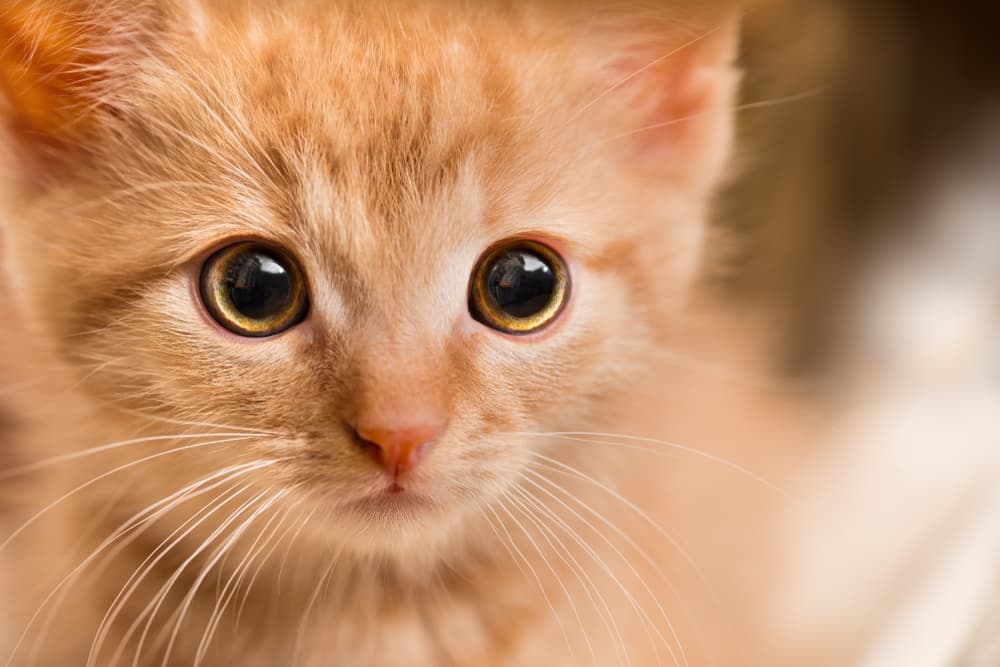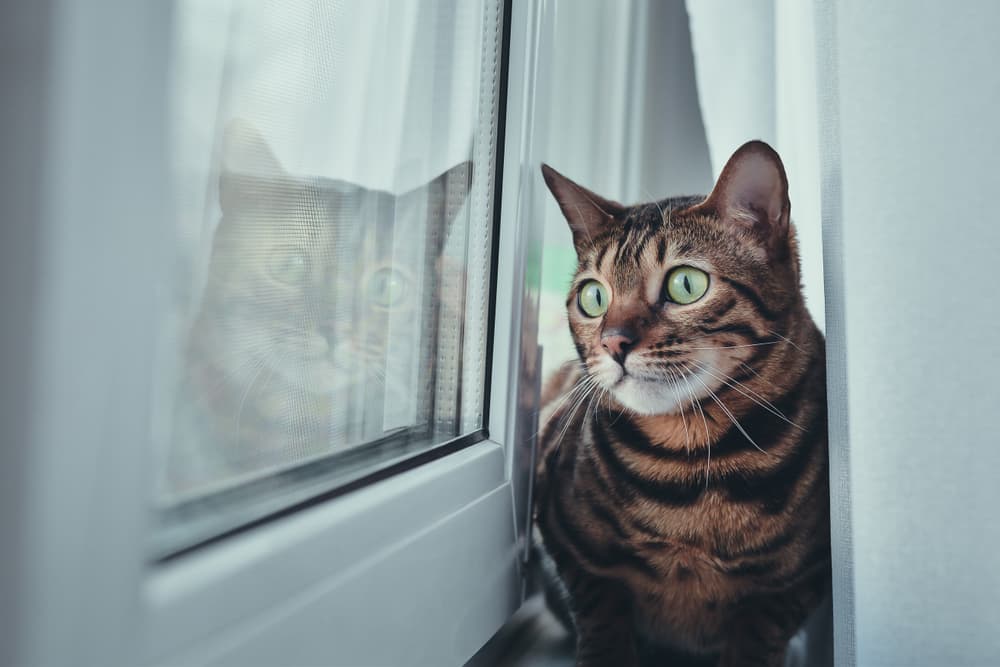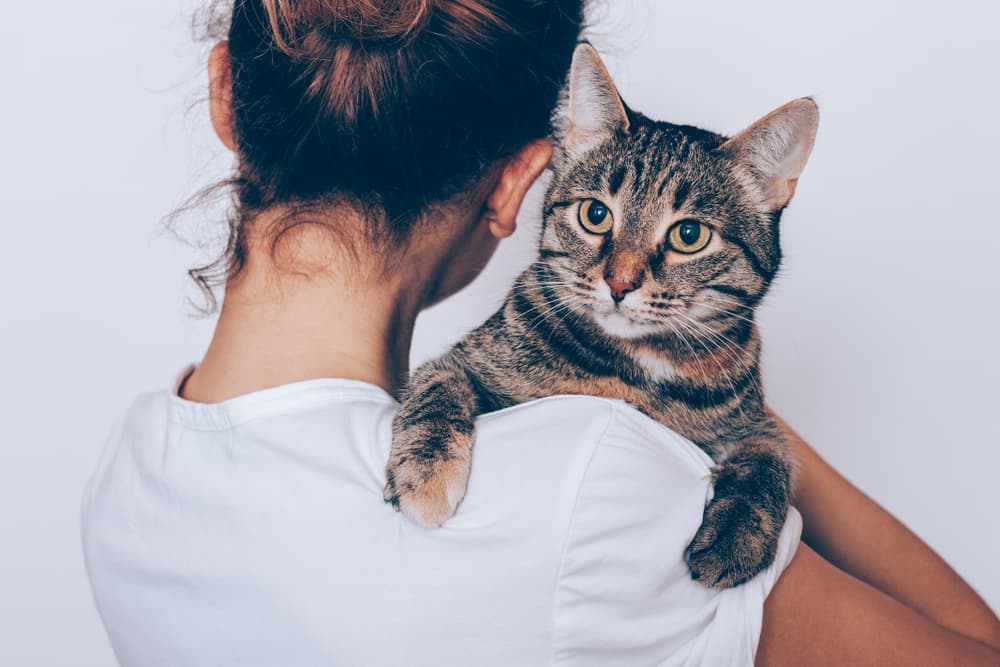8 Surprising Things That Stress Cats Out

A stressed-out cat makes for a stressed-out owner, especially when you can’t figure out what exactly is causing your pet’s anxiety.
Unfortunately, many signs of anxiety in cats (like increased aggression toward other pets or people, diarrhea, lack of appetite, urine-spraying outside of the litter box, and scratching up furniture) only make life harder for you and your pet (1).
While some cat stressors make perfect sense (like dogs and fireworks, for example), others are easy to miss because they simply don’t seem like significant sources of stress to pet owners.
If you’re wondering what’s gotten under your cat’s skin, read on to learn some of the most unexpected cat stressors you might encounter. Plus, learn how to deal with them to give you and your cat a better life.
Understanding Stress in Cats

To understand why cats are so prone to stress, it’s important to remember how they evolved. Cats are highly reactive because they are simultaneously predators looking for prey and prey to other animals as well, says Danielle Gunn-Moore, Ph.D., chair of feline medicine at the University of Edinburgh in Scotland.
When a cat is threatened by something unpleasant or potentially dangerous in her environment, this naturally triggers a flood of the stress hormone cortisol as part of her short-term stress response. This is called the fight-or-flight response, explains Dr. Bruce Kornreich, Ph.D., director of the Cornell Feline Health Center.
However, it doesn’t just take a growling dog to scare your cat. Any sudden shift in your cat’s environment—even a clean litter box that’s not placed to your cat’s liking— could cause cat stress and anxiety. Over time, if left untreated, chronic stress could lead to health issues like urinary tract problems, weight loss, and infections (2).
8 Surprisingly Stressful Things for Cats
“Cats are creatures of habit and do not like change,” says Dr. Karyn L. Collier, medical director of wellness medicine at Saint Francis Veterinary Center of South Jersey. As such, minor changes to your environment that might not bug you could send your cat into a stress spiral.
Here, a few surprising sources of cat stress and how to help your cat relax:
A Boring Kittenhood

A sometimes lesser-known cause of chronic cat stress is a lack of socialization in the first eight weeks of life, says Gunn-Moore. That’s the key window for introducing your kitten to everything she could possibly come across for the rest of her life, including pets and people of all shapes and sizes, lots of toys, and indoor and outdoor play areas.
If a kitten has a relatively uneventful upbringing, she is unfortunately more likely to grow into a stressed-out cat in adulthood.
How to help: In this case, the best thing you can do is provide your cat with an environment that has as few unexpected and sudden changes as possible, and do your best to ease her into new situations very slowly, says Gunn-Moore.
Unexpected People

For cats, any change in your inner circle can trigger stress. This includes people leaving the household (due to death, divorce, or going away to college) and new people joining the household (thanks to romantic relationships, marriage, new children, or older parents moving in). In fact, a visit from a stranger was the single most common source of stress for cats, according to a review in the Scientific World Journal.
How to help: Again, try to keep your cat’s world as close to normal as possible during times of transition with a fixed feeding schedule and a safe place to retire if she needs to step away, says Gunn-Moore. Gradually introduce her to new people by involving them in play sessions with some healthy treats to create a positive connection.

New Smells

The smell of your favorite scented candle, lemon-scented cleaner, and even freshly-laundered clothes might make you feel relaxed, but your cat might not feel the same way (2). Why? Because cats have such a powerful sense of smell, an offensive odor that they cannot escape can become an unexpected trigger, says Gunn-Moore.
How to help: Avoid citrus scents (which seem to stress out cats in particular), consider non-scented detergent, or just keep a well-ventilated home with fans or cracked windows when you’re cleaning.
Mirrors

Like dogs, cats lack self-awareness, which means that when they gaze into a mirror, they see another cat staring right back at them, says Collier. For some cats, that reflection means another cat is invading their territory, she explains.
How to help: If possible, keep your cat out of mirror-filled rooms or lift floor mirrors onto the wall outside of your cat’s line of sight. Removing the stressor should help keep your cat calm.
Conflicts Between Cats

It might seem like your cats are just playing, but in a multiple-cat household, inter-cat conflict is a common problem, especially if essential needs like the litter box and food are shared. This can result in a battle over resources, explains Kornreich. As it turns out, this is a common problem—one study found about a quarter of cats don’t have their own food bowls and more than half had to share their litter box with other cats.
How to help: Make sure you’ve got enough litter boxes (the number of cats you have plus one) and consult with your veterinarian or a cat behaviorist about how to avoid conflicts at feeding time. Sometimes, separate feedings can help calm down stressed-out cats, says Kornreich.
Outdoor Distractions

In her research, Gunn-Moore witnessed a cat struggle to pee in her litter box inside because cats lounging on a wall outside her window were watching—and having an audience stressed her out too much to go. While what goes on in your neighbors’ lives might not matter to you much, changes outside your home could trigger cat stress when something out of the ordinary happens.
How to help: Again, making sure your cat has a safe, quiet place to retire or use the litter box can help. This should be away from foot traffic, from loud noises and from doors. Creating welcome distractions (like classical music over the sound of construction or traffic outside) could also do the trick, says Gunn-Moore.
A Change in Your Work Life

If you get a new job, change shifts, or start getting home later than usual, your cat could start to pick up on these changes and get nervous. The reason is simple—cats like for life to go according to schedule, and any change can trigger stress.
How to help: If possible, ease your cat into your new schedule by making gradual adjustments, or help her ride out the transition process by making sure she has access to a place where she feels safe and lots of playtime when you are home, says Gunn-Moore.
Too Much Affection

Unfortunately, pet parents are often an unexpected source of stress for cats, says Gunn-Moore. This may be because you’re being overly affectionate. Often, pet parents want to nuzzle their cats or squeeze them close when their cats would be content with the occasional ear scratch.
How to help: Learn how to love your cat in a way that makes her more comfortable, says Gunn-Moore. Learn how to read your cat’s body language and respect her space if she seems anxious. There are plenty of ways to show affection—like play time and treats—without smothering her.
Cat Stress Relief: Tips and Tricks

In order to provide your cat stress relief, Kornreich recommends pet parents do the following:
- Establish a schedule and try to adhere to it.
- Remove known stressors from your home.
- Avoid sudden changes in your cat’s environment.
If you can’t remove a stressor (like another cat in your home), consider keeping them in separate rooms and then gradually reintroducing them in a neutral space, which can sometimes help ease cats into a better relationship, says Kornreich.
Beyond this, make sure to provide plenty of environmental stimulation—such as interactive toys and puzzle feeders—to prevent boredom and the stress that can accompany it. Try pairing a food puzzle with some calming chews to combat anxiety on two fronts. And if escape is your cat’s preference, offer your pet a place to climb and hide away, like a comfortable basket on a shelf, says Collier.


If you’re concerned about a stressed-out cat in your household, remember that chronic stress can lead to health issues over time. In order to figure out the best cat stress relief solution for your situation, call your veterinarian and consider asking for a referral to a cat behavior consultant.
Sometimes, pheromone sprays and diffusers as well as prescription medications can help treat more serious cases of cat stress.












